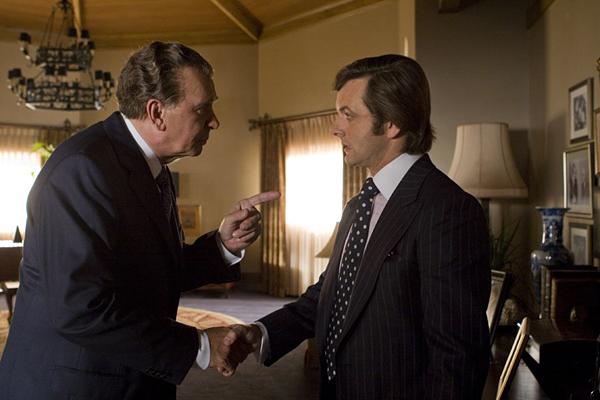
This isn’t exactly the most enthralling premise for anyone besides political nerds, but director Ron Howard (Apollo 13, The Andy Griffith Show) does a fine job bringing out the most dramatic and interesting aspects of the talks. Nixon’s Chief of Staff Jack Brennan (Kevin Bacon) compares the tension in the series of interviews to that of a boxing match. Frost is the up-and-comer, famous in Britain and finally getting his shot at American fame by scoring a primetime bout with the Champ.
Thankfully, though, Howard doesn’t actually set up the movie in this manner. Boxing matches generally involve tedious amounts of boredom mixed with quick flurries of entertaining action. The Frost/Nixon interviews get portrayed in a way that better resembles the documentary of a boxing match. With this format, the audience gets to see all the haymakers and combinations that actually land, interspersed with the ongoing struggles and anxieties of both the Frost and Nixon sides had throughout.
But the movie couldn’t survive without solid characters. Mostly, the movie couldn’t survive without a drop-dead awesome Richard Nixon. Even if the actor playing him does a good job, you go into the movie expecting a mix of historic images of Nixon with those of Langella, and you expect it to be at least slightly off-putting. However, once Langella’s Nixon first appears on screen, you instantly see how he embodies the president. In fact,
Langella quickly makes you forget that he’s impersonating Tricky Dick.
But amidst all the political jousting, the best part of the movie has nothing to do with politics. We’ve all been there. It’s late at night, all of your friends are out or gone, and all you really want is a cheeseburger. Suddenly, the phone rings. It’s one of your drunk friends. They kind of ramble on for awhile and maybe let a thing or two slip that they shouldn’t have, but it’s just a standard drunk dial, a common occurrence.
Now imagine that the “friend” that called you up was Richard Nixon. David Frost gets that phone call, where Nixon confesses many of his Watergate sins and commiserates with Frost for being “outsiders.” Although the plot point is a fabrication by screenwriter/playwright Peter Morgan, the scene and its aftermath are absolutely riveting, humanizing Nixon, briefly forgetting the tension that has built up, and showing us something a little more real than political theater.


















































